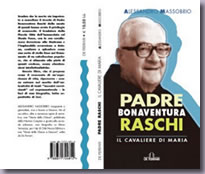
“Father Bonaventura Raschi, Mary’s knight” is a short but meaningful little volume, published by De Ferrari Editore (Genova 2003 € 12,00), in which Alessandro Massobrio, a Genoese teacher and journalist, goes through the important phases of the life of the founder of the Small Town of the Virgin.
I think nobody doubts the fact that the mystery of a human being, above all of a human being like Father Bonaventura Raschi, is practically inexhaustible. So this other biography – the third one after those by Piero Mantero and Margherita Enrico – has anyway something to add to a picture which has already been defined not only in its basic structure but also in the details.
This something consists perhaps in the reading key according to which the personality of the founder of the Small Town of the Virgin has been analysed and interpreted. It is a reading key which sounds, so to say, the roots more than the trunk. Believing that just in the roots and then in the cultural background of the protagonist of the story it was possible to find out the pushes, which then became the lines of force in the development of the plant.
Father Raschi was a conventual Minorite, so he belonged to the Franciscan family, from which his religious formation and his missionary work cannot prescind. His devotion to God’s Mother; his conception of life, meant as a chivalrous army at the service of the heart’s Lady; his sense of beauty, through which the creature is allowed to go back to its creator are unavoidable elements . Without them even a strong and determined personality like the Father’s one cannot be fully understood.
But Bonaventura Raschi had also an unshakable faith, an admirable firmness, an ability of reading the events beyond the appearance with which the same events are used to wrap themselves during our short earthly experience. If he hadn’t had these gifts, his same life, marked by obstacles and difficulties and his same death, marked, at least in appearance, by failure and solitude , would seem the stages of a strange and contradictory existential day. Which after a shining morning, enlightened by worldly success, is doomed to end in the shadows of the twilight.
It is not so, instead. Without taking away anything from the opinion of the Church about possible private revelations, for those who met him, like the author of this book, the work and the teachings of the founder of the Town of the Virgin remain fixed stars, luminous spots on the vault of a firmament wrapt in the darkness. A Firmament that without those fixed stars, without those luminous spots, would have nothing to suggest to those who continue their voyage on the sea of life.
Alessandro Massobrio
PENDING BE REPRINTED
Publisher:
DE FERRARI EDITORE S.R.L.
Via GABRIELE D`ANNUNZIO 2
16121 GENOVA
Telephone number 010532623/28
FROM "SETTIMANALE CATTOLICO" OF 28TH DECEMBER 2003
Alessandro Massobrio
FATHER BONAVENTURA RASCHI MARY'S KNIGHT
De Ferrari Editore
FROM "IL GIORNALE" OF 3RD JANUARY 2004
This is the review which appeared on the daily newspaper "Il Giornale" on
Saturday 3rd January 2004 in the section news events on page 39.
THE BOOK
ALESSANDRO MASSOBRIO
FATHER BONAVENTURA RASCHI. MARY'S KNIGHT
DE FERRARI 2003
PAGES 107, ? 12
THE FRANCISCAN WHO BUILT THAT SANCTUARY ON MOUNT FASCE.
Laura Crovella.
Little Town of the Virgin. It's an important and meaningful name which Father Raschi chose in memory of other Towns of the Virgin. Those that Father Maximilian Kolbe was founding during the Thirties in Poland and in Japan. He was the martyr who was slaughtered by Nazi ferocity in the death
camp at Auschwitz for the life of an innocent father of a family whose only guilt was to belong to a discriminated race. Father Kolbe had inflamed the fantasy of his Italian "disciple" for two precise reasons: his deep sensitivity to the instruments of modern social communication and his chivalrous devotion to the Virgin. It was a very Polish devotion and very Polish was also that "gift of the languages" thanks to which the religious man wanted to announce the Gospel on the radio and the newspapers to the men in the whole world. But it wasn't at all said that only the Poles could succeed in this deed. And Father Bonaventura Raschi, a true Italian (he was born near Siena and had elected Genoa as his town of adoption), would show it incontrovertibly starting from the Fifties. An incredible sequence of initiatives - from his activity as a preacher to that of exorcist, from the publishing of Marian periodicals to the fellowship with extraordinary men, among whom Father Pious - mark the development of a life which had its own crowning achievement in the realization of an act of love. The one whose object would be God's Mother to venerate in a temple dedicated to Her. Massobrio's book, which comes out in the Father's centenary, goes over again the phases of a life which was often a sign of contradiction but also the reaffirmation of values that every Christian conscience cannot give up and it does so in a very fluent and taking journalistic style.